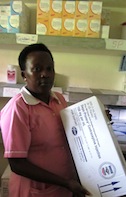UGANDA-HEALTH: When Women go Without Needed Contraceptives

When the monthly contraceptive injection that Bernadette Asiimwe, a mother of four, got from government health centres in western Uganda was out of stock for weeks, she fell pregnant with her fifth child.
By the time Assiimwe decided to pay for the contraceptive and went to Reproductive Health Uganda, a family planning association, she was already four weeks pregnant.
Asiimwe is not alone, many mothers like her in western Uganda have had unintended pregnancies due to shortages of commonly used contraceptives at government health facilities. Depo-Provera Contraceptive Injection is one of the most commonly used.
Donata Muhereza, a counselor at Reproductive Health Uganda in Mbarara, told IPS that the one-month contraceptive injection that Assiimwe used is popular because rural women find it easier to use compared to pills. Women also preferred it, Muhereza said, because they could take the contraceptive without the knowledge of their husbands. But the injection is rarely available at government health facilities.
'Mothers come here late after failing to find their injections at government hospitals. When we test them we find that they are pregnant. We cannot put them on any contraceptive. So we counsel them and let them go home.'
She said it was a common problem that usually occurred when government clinics ran out of the two most-used contraceptive injections. Muhereza added that women were subjected to violence by their husbands when they unintentionally fell pregnant.
'It happens that the husband was aware that his wife was on a contraceptive, but you find that the husbands become hostile (when they find out that their wives have fallen pregnant). Sometimes they abuse their wives. In the long run when a mother is not counseled well, then they resort to backyard abortions,' said Muhereza.
She said unintended pregnancies and abortions in Mbrarara are common and that non-professionals perform most abortions. An estimated 297,000 abortions are performed in Uganda because most of the pregnancies are unintended according to a study conducted in 2005 by the Guttmaacher Institute between 2003 and 2005.
A health worker at Kakooba Health Centre, who declined to be named, told IPS that the centre has not had three types of the commonly used contraceptives for about two months.
'We are equally in a dilemma. We want to help the women because we know the dangers of not taking the pills as required,' she said.
'We instead give them condoms advising them to convince their husbands to use protection until we have restocked. But some women are not be able to convince their husbands (to use condoms) so they fall pregnant,' she added.
Kaguna Amoti, district health officer at Mbarara District Administration said the shortages were not widespread in the district. 'We are aware of the problem but it is not affecting all contraceptives. Our counselors are suggesting other types of contraceptives until when we have stocked again,' said Kaguna.
However, family planners have explained that not all forms of contraceptives are suitable for everyone. For example, pills are not suitable for rural women because they are required to be taken daily. Most rural women prefer to take a monthly contraceptive injection.
Wagama Theresa, a senior nursing officer in the neighbouring Bushenyi district told IPS that the situation there was no different from Mbarara. 'We are lucky that some health centres have the injectables in stock but some don’t have so mothers are advised to try the next health centres where the contraceptive is in stock.'
She explained that persistent contraceptive shortages were frustrating for the husbands who supported their wives with family planning.
'Some men have begun supporting their wives in family planning. But when they come and don’t find their selected contraceptive (available), they get frustrated and you will never see the husbands back here,' said Wagama.
Eliab Tayebwa, the head of Reproductive Health and HIV/AIDS in Bushenyi district explained that the district experienced contraceptives shortages when there was a delay in delivery from National Medical stores.
'Contraceptives come in medicine kits like other drugs. So when the kits have not been delivered then you will not have contraceptives and other medicines,' he said.
Access to and use of family planning in Uganda has been identified as one of the factors in achieving 2015 United Nations Millennium Development Goals (MDGs), but progress in both these areas has been slow.
The 2006 Uganda Demographic Health Survey showed that 41 percent of women in Uganda needed contraception, but could not get it.
Dr. Moses Muwonge, a reproductive health expert, said government was not committed to family planning initiatives, which has led to the contraceptive shortages. Muwonge said that only 600,000 dollars was allocated to contraceptives in the financial year 2010/2011.
But Dr. Kenya Mugisha, the Acting Director General at the ministry of health services blamed some districts for causing contraceptive shortages. 'Money is sent to districts with tentative budgets, but the districts re-prioritise and contraceptives may not get the vote they deserve,' he said.
Mugisha explained that his ministry has devised a new strategy to deliver family planning services to rural populations, given that 51 percent of Uganda’s population lives more than five kilometres from the nearest health facility.
The community-based access to injectable contraceptives, according to Mugisha, is expected to reduce unmet demand for family planning.
Mugisha added the strategy would only work once more money was made available to extend services and purchase the needed contraceptives. 'We need more than double what we are offering today. And that is the big challenge we are facing, not just with contraceptives but in the general health sector,' he said.
© Inter Press Service (2011) — All Rights ReservedOriginal source: Inter Press Service
 Global Issues
Global Issues